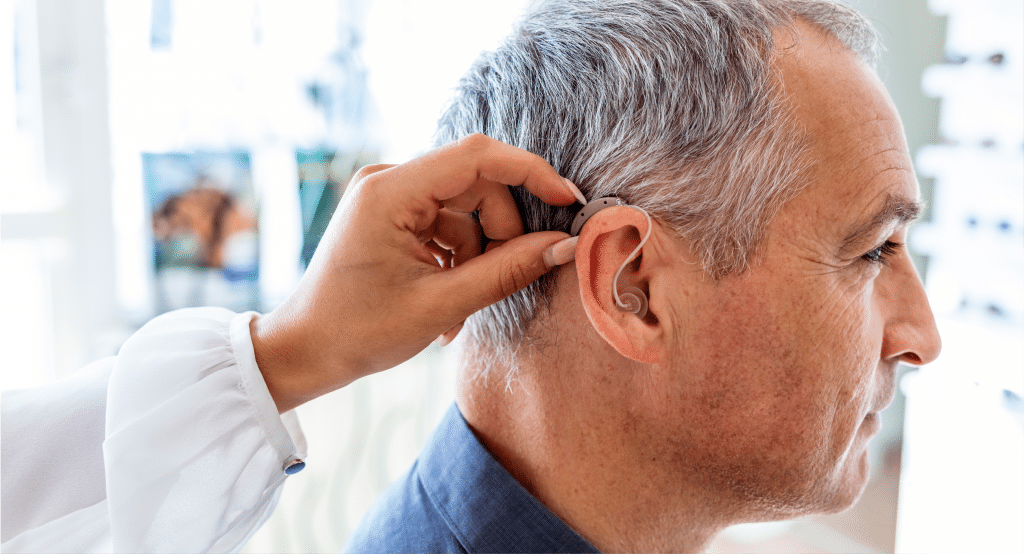Hearing aids are more than a luxury — they are a necessity.

“Even mild hearing loss doubles the risk of dementia,” said Rajarshi Pratihar, AuD, MHA, MBA, audiologist with UT Physicians. “It’s not just about your quality of life. Hearing aids can act as a facilitator for your brain and cognitive health.”
Hearing loss may also be associated with balance disorders, which could lead to falls. It also raises the risk of loneliness, depression, and anxiety.
For Better Hearing and Speech Month, Pratihar, director of audiology with McGovern Medical School at UTHealth Houston, discusses the available options for people with hearing loss and what to consider before purchasing hearing aids.
Over-the-counter (OTC) hearing aids
In October 2022, the U.S. Food and Drug Administration established a category of OTC hearing aids available for purchase without a medical exam, prescription, or professional fitting. Additionally, these products often cost less than prescription hearing aids for certain kinds of hearing loss.
OTC hearing aids are considered short-term solutions, and not necessarily the most cost-effective over time.
“They can help treat mild to moderate hearing loss, but they can’t be customized based on an individual’s hearing loss,” Pratihar said. “Because they’re ‘one size fits all,’ the level of effectiveness may not be the same as prescribed hearing aids. When I provide in-office hearing aid trials, patients tend to prefer premium prescription devices over basic ones based on perceived sound quality and other aspects.”
OTC hearing aids also have a much shorter life span.
“They may be more affordable than prescribed hearing aids, but they usually just come with a one-year warranty without loss and damage coverage,” Pratihar said. “They’re not affordable if you think of long-term investment.”
It is best to visit an audiologist for a hearing aid evaluation and make a cost-benefit analysis first. For example, prescription hearing aids may still be useful if the hearing loss worsens (to a certain extent) in the future, whereas OTC devices have volume or gain control limited to mild to moderate hearing loss.
“An audiologist can check if it’s a middle ear problem, like fluid or infection, or if it’s a sensorineural loss (inner ear) that needs a hearing aid,” Pratihar said. “Then the audiologist can inform you of the costs of customized hearing aid options, which usually come with a three-year warranty and a personalized service package (free cleanings, programming, and adjustments). Additionally, you have the option to extend your warranty after a three-year period, and the typical life of a prescription hearing device is at least five years.
“Afterward, you can decide the best value for you.”
Prescription hearing aids
Prescription hearing aids require a professional hearing exam for optimal hearing benefits. They are more durable, adjustable, and advanced than OTC devices, and they are necessary for severe-to-profound hearing loss or anyone below the age of 18.
No-Cost Hearing Screening DayUT Physicians – Bellaire StationWednesday, May 24 10 a.m. – 2 p.m. 6500 W. Loop South, Suite 200 Bellaire, TX 77401. *please enter the clinic via the rooftop of the parking garage |
Prescription hearing aids are a better long-term solution.
They are relatively pricier due to the technology and professional labor involved, but they come in many sizes, styles, and features to fit the person’s needs and budget.
“Sometimes a basic model is fine, but often you may need something on a higher level for better speech processing and background noise reduction,” Pratihar said. “Much of it depends on your level of hearing status and hearing needs such as occupation, hobbies, home, and social environments.”
With prescribed hearing aids, an audiologist can help maintain the device and make any necessary sound adjustments.
“If you find them difficult to use, or if you don’t notice a considerable improvement in hearing, you won’t use them, and they won’t benefit you,” Pratihar said. Prescription devices come with a one-month trial period, so you have the option to return or change to a different device.
Success with hearing aids requires three steps: 1) Have an audiologist perform a hearing assessment; 2) Select the right type of hearing device based on need and lifestyle; and 3) Have an audiologist perform programming and follow-up testing along with long-term care and maintenance.
“It’s important to make sure the hearing aids are doing what they’re designed to do and assist the patient until they’re comfortable and mindful of their hearing aids,” he said.
Before purchasing hearing aids, always ask an audiologist about a free trial period and financing options.
Smart hearing devices (rechargeable, Bluetooth, and remote programming)
State-of-the-art hearing aids come with Bluetooth wireless technology, and most are compatible with smartphones. Additionally, they are rechargeable, avoiding the difficulty of changing tiny batteries due to poor vision or dexterity.
Hearing aids with Bluetooth streaming require more programming and can drain batteries faster, but the capability offers some clear advantages.
“With Bluetooth streaming, the sound goes directly into the hearing aid. When you receive a phone call, for instance, you can better hear the caller because the hearing aid receives the sound directly from your smartphone. You can also better hear the television if it’s Bluetooth-enabled.”
Hearing aids with Bluetooth streaming can also be programmed to reduce background noise.
“This makes speech understanding easier, especially if you’re in the car or noisy place,” Pratihar said.
Hearing aids could be programmed remotely, potentially avoiding an unnecessary clinic visit.
“You can still come into the clinic, but with your smartphone, we can make lots of adjustments remotely,” he said.
No matter the type of hearing aid, make an informed decision before investing with the help of an expert.
“Our job as audiologists is not to push products,” Pratihar said. “It is to provide compassionate care and help patients focus on their quality of life and overall health.”
Learn more or schedule an appointment with an audiologist.


